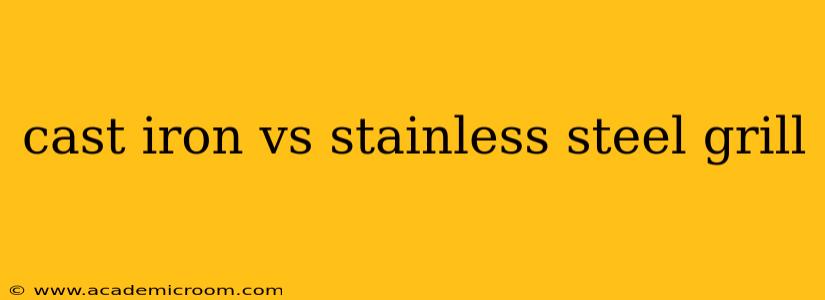Choosing between a cast iron and stainless steel grill can feel like navigating a culinary minefield. Both materials offer distinct advantages and disadvantages, making the "best" choice highly dependent on your individual needs and grilling style. This comprehensive guide will delve into the key differences, helping you make an informed decision for your next outdoor cooking adventure.
What are the Key Differences Between Cast Iron and Stainless Steel Grills?
The core differences lie in their heat retention, durability, and maintenance requirements. Cast iron grills excel at retaining heat, leading to superior searing and even cooking. Stainless steel grills, on the other hand, are known for their durability and ease of cleaning. Let's break down the specifics:
Heat Retention and Even Cooking:
-
Cast Iron: Cast iron's high thermal mass means it heats up slowly but retains heat incredibly well. This allows for consistent cooking temperatures and excellent searing capabilities, creating those beautiful grill marks and perfectly cooked meats. The heavier weight also contributes to its stability.
-
Stainless Steel: Stainless steel heats up faster than cast iron but doesn't retain heat as effectively. Temperature fluctuations can be more common, requiring more attention to avoid uneven cooking. While good for grilling, it generally doesn't achieve the same level of sear as cast iron.
Durability and Longevity:
-
Cast Iron: A well-seasoned cast iron grill can last a lifetime, becoming even better with age. However, it's susceptible to rust if not properly cared for. Its weight can also make it cumbersome to move.
-
Stainless Steel: Stainless steel is inherently resistant to rust and corrosion, making it a low-maintenance option. It’s generally lighter than cast iron, making it easier to maneuver. However, it can scratch and dent more easily than cast iron.
Cleaning and Maintenance:
-
Cast Iron: Requires more diligent cleaning and maintenance. After each use, it needs to be cleaned, dried thoroughly, and re-seasoned to prevent rust. This process is essential for its longevity.
-
Stainless Steel: Easier to clean than cast iron. A simple scrub with soap and water is usually sufficient. However, stubborn food residue might require a bit more elbow grease.
What are the Pros and Cons of Each?
Let's summarize the advantages and disadvantages of each material in a table:
| Feature | Cast Iron Grill | Stainless Steel Grill |
|---|---|---|
| Heat Retention | Excellent, even cooking, superior sear | Good, but less even, less intense sear |
| Durability | Extremely durable, lasts a lifetime | Durable, but can scratch and dent |
| Weight | Heavy, less portable | Lighter, more portable |
| Maintenance | High, requires seasoning and care | Low, easy to clean |
| Rust Resistance | Low, requires proper care | High, naturally resistant |
| Cost | Generally more expensive upfront | Generally less expensive upfront |
Which Grill is Right for You?
The best grill depends on your priorities:
-
Choose cast iron if: You prioritize superior searing, even cooking, and are willing to invest time in maintenance. You value a grill that will last for generations.
-
Choose stainless steel if: You prioritize ease of cleaning, lightweight portability, and lower maintenance. You're looking for a durable and reliable grill without the commitment required for cast iron.
How Much Does Each Type of Grill Cost?
The cost varies greatly depending on size, brand, and features. Generally, high-quality cast iron grills tend to be more expensive upfront than stainless steel grills of comparable size. However, the long lifespan of a cast iron grill can offset this initial investment over time.
How Do I Clean and Maintain Each Type of Grill?
Cleaning and maintenance are crucial for the longevity of both types of grills. Specific instructions vary by manufacturer, so always consult your grill's manual for detailed instructions. However, general guidelines include:
-
Cast Iron: After each use, allow the grill to cool completely. Clean with a wire brush, removing any food residue. Wash with hot water, dry thoroughly, and apply a thin layer of cooking oil to re-season.
-
Stainless Steel: Clean with warm soapy water and a brush or sponge. For stubborn food, use a grill cleaner following the manufacturer’s instructions.
Ultimately, the best grill for you will depend on your personal grilling style and preferences. Weigh the pros and cons of each material carefully to make the best choice for your outdoor cooking needs.
